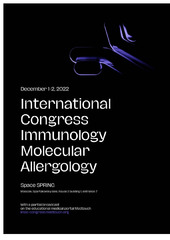Приказ основних података о документу
SARS CoV-2 nucleocapsid-based diagnostic tests and serological response in allergic children
| dc.creator | Ćirković-Veličković, Tanja | |
| dc.creator | Radomirović, Mirjana Ž. | |
| dc.creator | Simović, Ana | |
| dc.creator | Jovanović, Vesna B. | |
| dc.creator | Ćujić, Danica R. | |
| dc.creator | Gnjatović, Marija Lj. | |
| dc.creator | Stojanović, Marijana | |
| dc.date.accessioned | 2023-01-27T14:38:24Z | |
| dc.date.available | 2023-01-27T14:38:24Z | |
| dc.date.issued | 2022 | |
| dc.identifier.uri | http://cherry.chem.bg.ac.rs/handle/123456789/5777 | |
| dc.description.abstract | RT-PCR remains the primary method of diagnosing SARS-CoV-2. Serological diagnosis of COVID-19 is simple and does not require complex techniques and equipment, rendering it suitable for rapid detection and massive screening. However, serological tests cannot confirm SARS-CoV-2, and results will be false negative when antibody concentrations fall below detection limit. Serological testing is important method for diagnosis of severe acute respiratory syndrome coronavirus 2 (SARS CoV-2) infection. Antigen-based tests show high specificity, but sensitivity is relatively low. For development and further improvement of both serological and antigen-based tests, availability of recombinantly producted SARS CoV-2 antigens is needed and during the periods of high demend in the pandemic, it was a limited factor both for research and diagnostic tests production by national producers of tests. Nucleocapsid (N) protein is the most abundant virus derived protein and strong immunogen. We aimed to find its efficient, low-cost production. SARS-CoV-2 recombinant fragment of nucleocapsid protein (rfNP; 58-419 aa) was expressed in E. coli in soluble form, purified and characterized biochemically and immunologically. Purified rfNP has secondary structure of full-length recombinant N protein, with high percentage of disordered structure (34.2%) and of beta-sheet (40.7%). rfNP was tested in immunoblot using sera of COVID-19 convalescent patients. Cost-effective approach for soluble recombinant N protein fragment production was developed, with reliable IgG and IgM antibodies detection of SARS-CoV-2 infection. ELISA was optimized with sera of RT-PCR confirmed positive symptomatic patients and healthy individuals. IgG detection sensitivity was 96% (47/50) and specificity 97% (67/68), while IgM detection was slightly lower (94% and 96.5%, respectively). Application of serological ELISA for seropositivity detection in 200 allergic children in comparison to non-allergic did not show a bias towards any of the tested groups. Furthermore, we have optimized production of rfNP at a large scale to raise specific antibodies to N-protein in rabbit and mice and develop an in house ELISA for quantification of N protein in biological fluids. Test was clinically validated in 200 PCR positive patients and showed a sensitivity of around 50%. | sr |
| dc.language.iso | en | sr |
| dc.relation | info:eu-repo/grantAgreement/MESTD/inst-2020/200168/RS// | |
| dc.relation | info:eu-repo/grantAgreement/ScienceFundRS/Fond_2020_COVID19/7542203/RS// | |
| dc.relation | Serbian Academy of Sciences and Arts GA No. F-26. | |
| dc.rights | openAccess | sr |
| dc.rights.uri | https://creativecommons.org/licenses/by-nc/4.0/ | |
| dc.source | International Congress on Molecular Immunology and Allergology (IMAC-2022), Moscow, December 1-3, 2022 | |
| dc.subject | SARS CoV-2 | |
| dc.subject | recombinant protein production | |
| dc.subject | nucleocapsid | |
| dc.subject | diagnostic test | |
| dc.title | SARS CoV-2 nucleocapsid-based diagnostic tests and serological response in allergic children | sr |
| dc.type | conferenceObject | sr |
| dc.rights.license | BY-NC | sr |
| dc.type.version | publishedVersion | sr |
| dc.identifier.fulltext | http://cherry.chem.bg.ac.rs/bitstream/id/32381/SARS_CoV-2_pub_2022.pdf | |
| dc.identifier.rcub | https://hdl.handle.net/21.15107/rcub_cherry_5777 |


